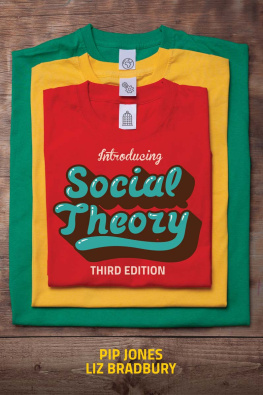ROUTLEDGE LIBRARY EDITIONS: SOCIAL THEORY
Volume 4
APPROACHES TO SOCIOLOGY
APPROACHES TO SOCIOLOGY
An introduction to major trends in British Sociology
Edited by
JOHN REX
First published in 1974
This edition first published in 2015
by Routledge
2 Park Square, Milton Park, Abingdon, Oxon, OX14 4RN
and by Routledge
711 Third Avenue, New York, NY 10017
Routledge is an imprint of the Taylor & Francis Group, an informa business
1974 Routledge & Kegan Paul
All rights reserved. No part of this book may be reprinted or reproduced or utilised in any form or by any electronic, mechanical, or other means, now known or hereafter invented, including photocopying and recording, or in any information storage or retrieval system, without permission in writing from the publishers.
Trademark notice: Product or corporate names may be trademarks or registered trademarks, and are used only for identification and explanation without intent to infringe.
British Library Cataloguing in Publication Data
A catalogue record for this book is available from the British Library
ISBN: 978-0-415-72731-0 (Set)
eISBN: 978-1-315-76997-4 (Set)
ISBN: 978-1-138-78608-0 (Volume 4)
eISBN: 978-1-315-76385-9 (Volume 4)
Publishers Note
The publisher has gone to great lengths to ensure the quality of this reprint but points out that some imperfections in the original copies may be apparent.
Disclaimer
The publisher has made every effort to trace copyright holders and would welcome correspondence from those they have been unable to trace.
Approaches to sociology
An introduction to major trends in British Sociology
Edited by
John Rex
First published in 1974
by Routledge & Kegan Paul Ltd
Broadway House, 68-74 Carter Lane,
London EC4V 5EL and
9 Park Street,
Boston, Mass. 02108, U.S.A.
Printed in Great Britain by
Unwin Brothers Limited
The Gresham Press
Old Woking Surrey
Routledge & Kegan Paul 1974
No part of this book may be reproduced in any form without permission from the publisher, except for the quotation of brief passages in criticism
ISBN 0 7100 7824 2 (c)
ISBN 0 7100 7825 0 (p)
Library of Congress Catalog Card No. 73-92988
Contents
John Rex
John Westergaard
Ronald Fletcher
Frank Bechhofer
Peter Abell
Roland Robertson
Peter Lassman
Basil Bernstein
Jock Young
John Rex
David Frisby
Miriam Glucksmann
Herminio Martins
Introduction
John Rex
In contemporary America the situation of sociology has been likened to that of Marxism in Maos China in the thousand flowers period. After a long period of a prevailing orthodoxy which centred around the monumental works of Talcott Parsons about the theory of social systems, on the one hand, and the measurement in more and more refined forms of the indicators, which, it was argued, told us something about the behaviour of those systems, on the other, suddenly systems theory and empiricism alike lost favour and everyone seemed licensed to say what he liked about anything and call it sociology. There is no exact parallel to this in Britain, where sociology in the 1950s was miserably underdeveloped anyway, but it is true that, partly owing to the explosion of higher education, and partly owing to the diffusion of new trends and movements from the USA and Europe, there were a multitude of new trends. This gathering of essays is an attempt by one sociologist, now in medium middle age, but who once saw himself as in the vanguard of protest and reform, to reflect the present state of affairs. Whether the selection is judicious will be for colleagues and future students to judge, but it is perhaps not without significance that the editors own contribution to the debate appears somewhere around the middle.
It has often been remarked that sociology in England was a late developer as an academic subject. There are important intellectual, institutional and political reasons for this but there is no need to go into them here. What is more to the point is that sociology was to all intents and purposes concentrated at the London School of Economics and that within that institution there were two main lines of development. On the one hand there was an essentially Fabian interest in social reform based upon the presumption that equality was a desirable goal and that it was the proper professional concern of the sociologist to find ways of measuring progress towards such equality. On the other there was the application to social forms of the general notion of evolution. From the time of Herbert Spencer onwards the intellectual harvest of empire was to be found in a series of attempts to arrange the known cultures and social systems of the world into some sort of developmental order. By the 1950s the principal representatives of these two traditions were Professor Glass, whose collection of essays Social Mobility in Britain1 represented a significant landmark in the understanding of British society, and on the other hand by Professor Morris Ginsberg, who, first with L. T. Hobhouse and then on his own, concerned himself not solely with evolution but with the supra-sociological question of moral and political progress.
It is fitting that this volume should start with the contributions of two younger sociologists who, while they have both made significant contributions in many other spheres, have continued to profit from the insights which their inheritance at the LSE provided. John Westergaard here looks beyond the crude statistics and affirms that it is still one of the most important ways of studying a society to look at what one can grasp precisely about its system of stratification. Ronald Fletcher, on the other hand, shows that whatever variety there may be amongst contemporary sociological approaches, the subject is essentially one, and the arrangement of what is discovered about social forms in some type of evolutionary order is bound to be the culmination of the sociological enterprise.
On the level of methods of data gathering and processing in the early 1950s British sociology had not progressed very far. What were most readily available were demographic techniques applied to official statistics. There had been no Paul Lazarsfeld to call for the testing of sociological hypotheses by the techniques of the social survey, and, while there were science fiction type stories in the newspapers of the invention of a mechanical brain, even the IBM counter-sorter, let alone the computer, had not really made any impact on sociology. What was to be expected, therefore, as one of the major developments of the late 1950s and early 1960s, was a concern with genuine sociological problems as distinct from those of statistical aggregates, and the handling of these problems by more and more sophisticated empirical techniques. Thus a lot of interest was focused on the study of the carworkers of Luton, both because of the role in it of David Lockwood, whose book







